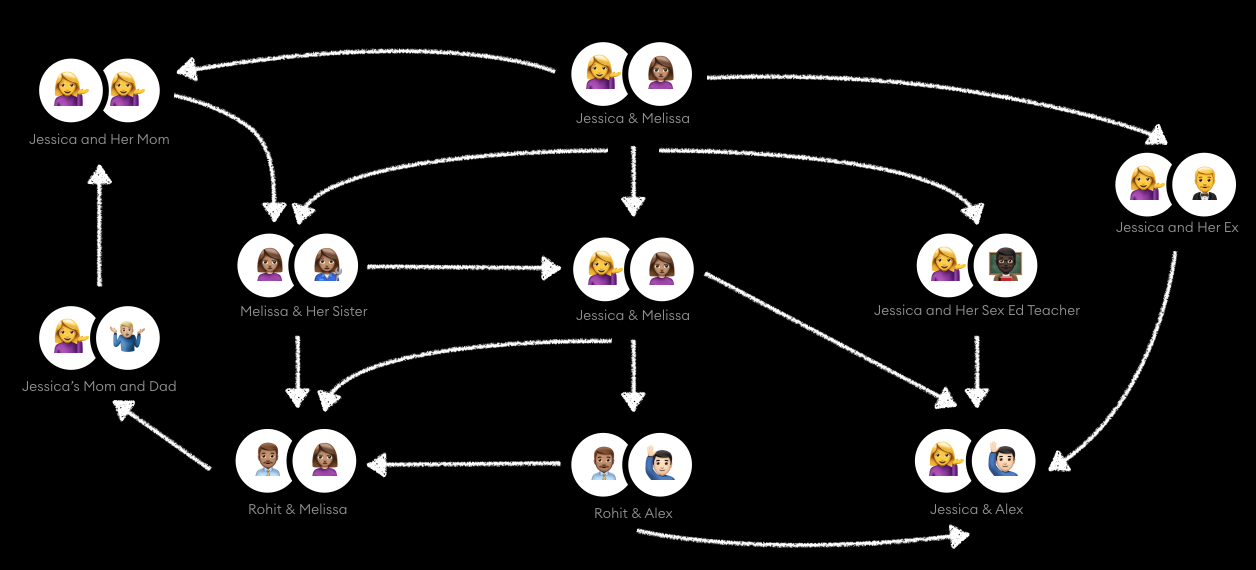To scale Talk digitally, we created Virtual Talk. Virtual Talk is a mobile phone game that introduces students to sex education through interactive narrative. Stories are told through a series of text messages, delivered to teach students various types of information.
Virtual Talk is set in the Talk Conversational Universe [TCU], which is a fictional world that contains many characters in complicated relationships. Players see the world through the eyes of it’s characters by seeing glimpses of their text conversations and interactions with other characters.
In the TCU, you play as one character interacting with other characters through text messaging. At the end of a story, players may continue to see more stories from their character’s point of view, or, they might transition into another story about a character that they were introduced to throughout their journey in the TCU.
By following characters as they go through their lives, the TCU creates a web of relationships that can teach any kind of content.
The TCU is infinitely scalable, and can be expanded to teach more content and topics.

In Virtual Talk, stories are told through a text messaging format. This format is already extremely popular amongst young adults, with applications liked Hooked and Choices topping app charts. The format is familiar to teens, who often use text messaging to communicate with others. Finally, the format is also better than what currently exists out there. Information about sex on the web currently exists in large blocks of text that are often overwhelming. A text messaging format is more manageable for users to consume.
The text messaging format allows us to create realistic dialogue. This was important to us because we not only wanted to teach students route information, we wanted to make sure that they can apply that information to scenarios that they may encounter in real life. By creating realistic dialogue, players are empowered with new ways to communicate tough topics. In addition, we’ve mimicked the way that teenagers and young adults talk to each other, increasing immersion and interest in the story.
The text messaging format also gives us the ability to plant seeds of doubt into our players. We’ve done this by writing dialogue that makes factual claims, or reveals misconceptions. Something that we noticed was that players would question whether what our characters were saying is true. This seed of doubt would increase engagement and student interest in what the characters were talking about, helping us to retain interest throughout player interactions with the game. We affirm factual statements and dispel misconceptions by adding in resources throughout our dialogue from outside sources. These resources serve as an opportunity for students to learn more, and also as an opportunity for students to become exposed to what they don’t know.
Another feature that we have provided within this universe is personalized recommendations. Outside of the first few stories (consistent across player experiences), players are then recommended different paths to take. Each path would help to fill gaps in student knowledge, identified by previous forms of assessment. We have included this feature to ensure that students are not learning things that they are already familiar with, but instead, are constantly learning something new.
Throughout our narrative, we have provided decision points within our stories for players to choose how to respond or continue. We found that decision points are fun and interactive. They give teenagers a sense of agency and autonomy, something that may not be fulfilled in their everyday lives. In addition, decision points also serve as a learning tool, showing players the consequences of their decisions. They can also serve as points for reflection (forcing players to think more about a certain situation), and a place for the platform to collect information from players (assessing their knowledge).
We have also included many microinteractions within our solution to help to increase satisfaction and delight in our product. Text message bubbles serve to build suspense throughout the story, while text messaging tapping interactions force players to interact and empathize with the story.
The TCU gives us the ability to create complex and sophisticated characters that people can relate to. The infinitely scaling world allows us to include characters of all backgrounds and sexual orientations, giving players the opportunity to learn more about people unlike themselves. We found in our research that our participants would often have strong views towards the characters that we created. This feature increases immersion and makes our experience more delightful.